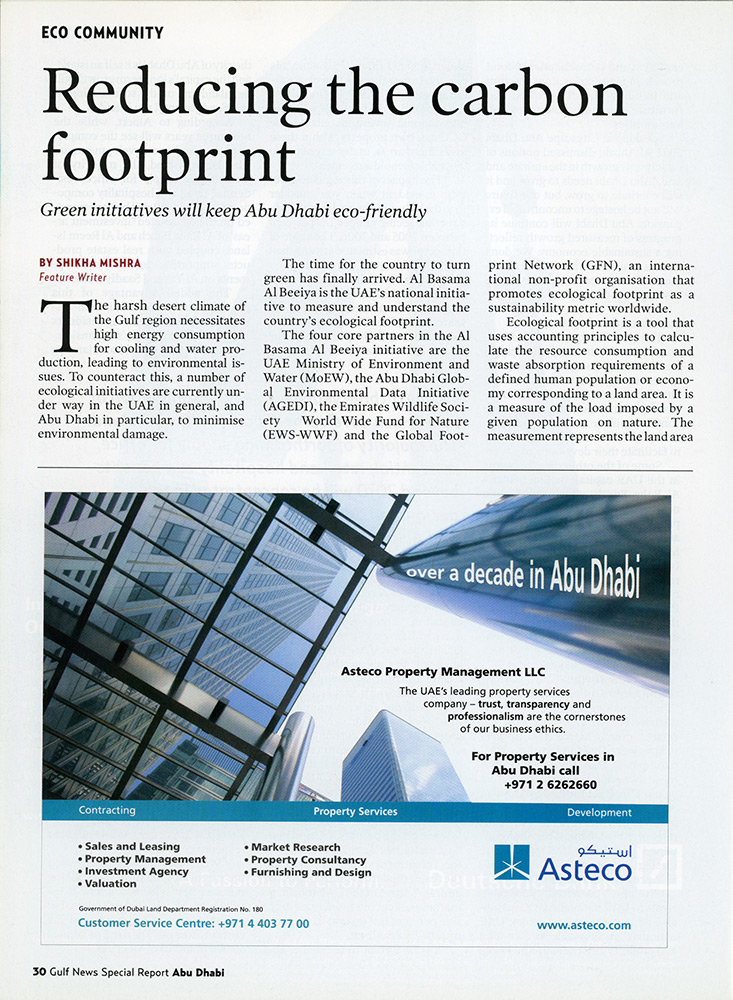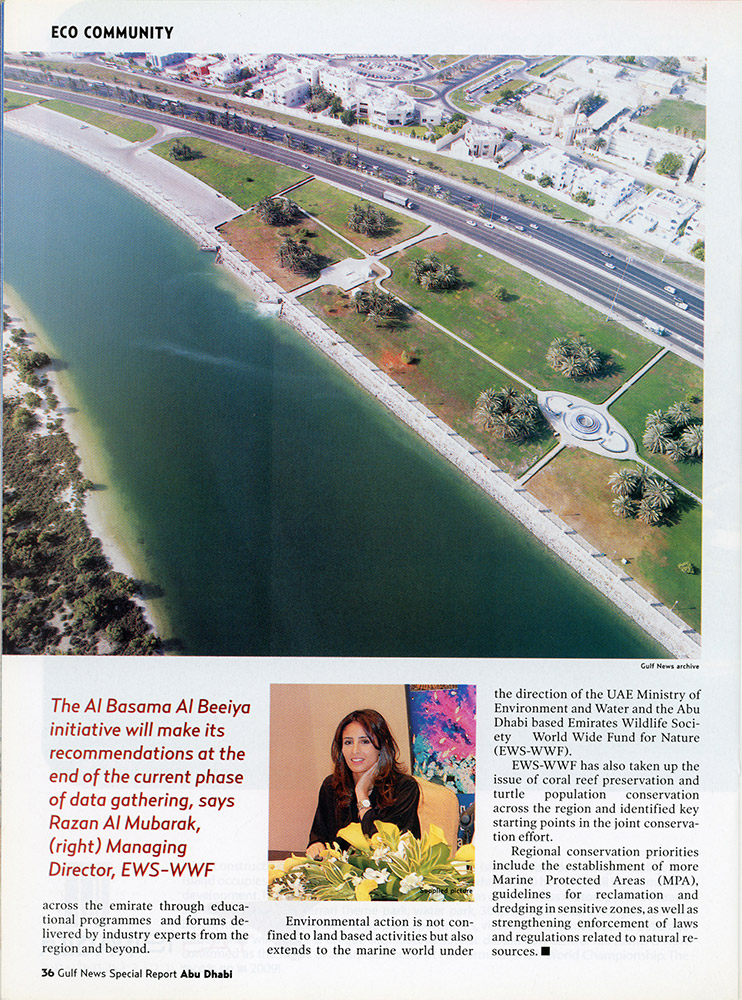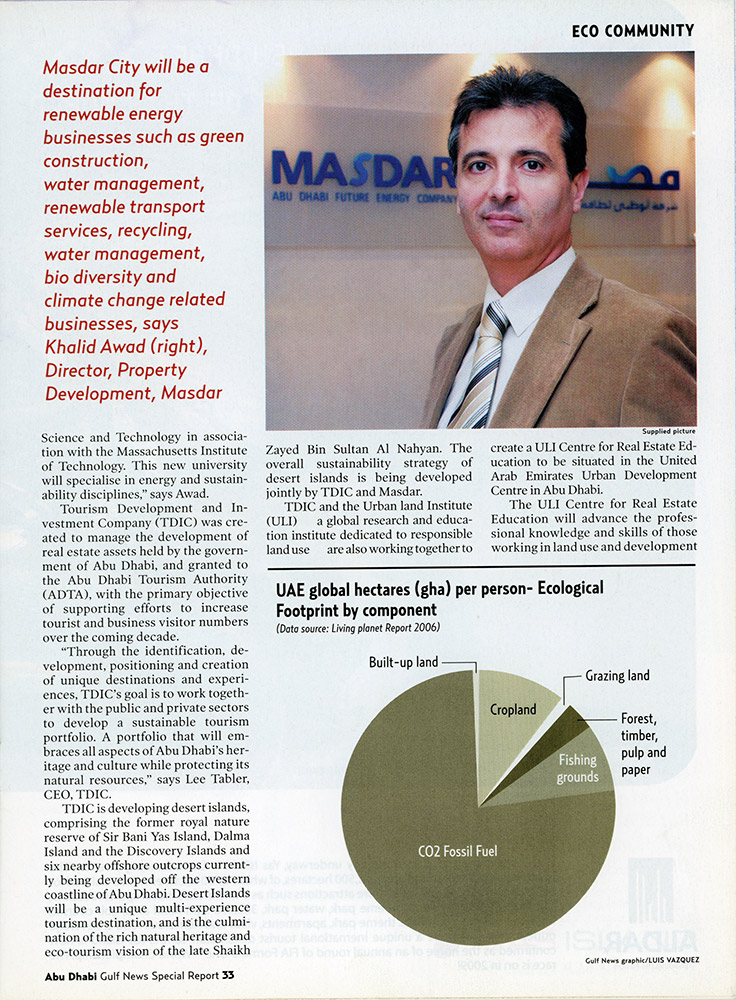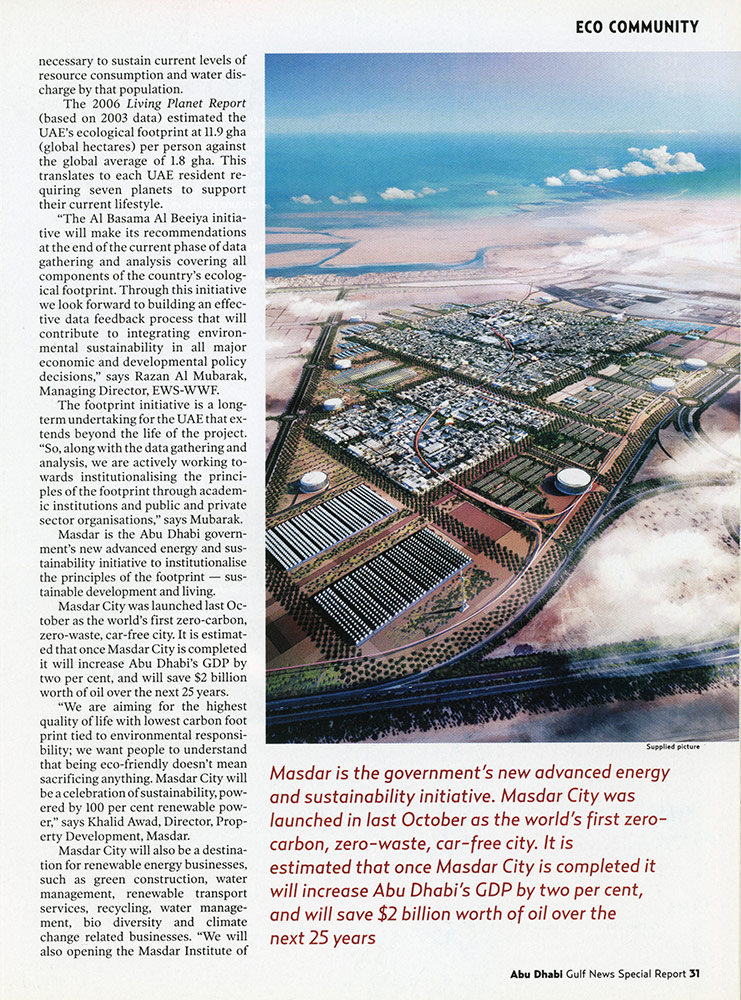Reducing the carbon footprint
Green initiatives will keep Abu Dhabi eco-friendly
The harsh desert climate of the Gulf region necessitates high energy consumption for cooling and water production, leading to environmental issues. To counteract this, a number of ecological initiatives are currently under way in the UAE in general, and Abu Dhabi in particular, to minimise environmental damage.
The time for the country to turn green has finally arrived. Al Basama Al Beeiya is the UAE’s national initiative to measure and understand the country’s ecological footprint.
The four core partners in the Al Basama Al Beeiya initiative are the UAE Ministry of Environment and Water (MoEW), the Abu Dhabi Global Environmental Data Initiative (AGEDI), the Emirates Wildlife Society World Wide Fund for Nature (EWS-WWF) and the Global Footprint Network (GFN), an international non-profit organisation that promotes ecological footprint as a sustainability metric worldwide. Ecological footprint is a tool that uses accounting principles to calculate the resource consumption and waste absorption requirements of a defined human population or economy corresponding to a land area. It is a measure of the load imposed by a given population on nature. The measurement represents the land area
necessary to sustain current levels of resource consumption and water discharge by that population.
The 2006 Living Planet Report (based on 2003 data) estimated the UAE’s ecological footprint at 11.9 gha (global hectares) per person against the global average of 1.8 gha. This translates to each UAE resident requiring seven planets to support their current lifestyle.
“The Al Basama Al Beeiya initiative will make its recommendations at the end of the current phase of data gathering and analysis covering all components of the country’s ecological footprint. Through this initiative we look forward to building an effective data feedback process that will contribute to integrating environmental sustainability in all major economic and developmental policy decisions,” says Razan Al Mubarak, Managing Director, EWS-WWFE.
The footprint initiative is a longterm undertaking for the UAE that extends beyond the life of the project. “So, along with the data gathering and analysis, we are actively working towards institutionalising the principles of the footprint through academic institutions and public and private sector organisations,” says Mubarak.
Masdar is the Abu Dhabi government’s new advanced energy and sustainability initiative to institutionalise the principles of the footprint — sustainable development and living.
Masdar City was launched last October as the world’s first zero-carbon, zero-waste, car-free city. It is estimated that once Masdar City is completed it will increase Abu Dhabi’s GDP by two per cent, and will save $2 billion worth of oil over the next 25 years.
“We are aiming for the highest quality of life with lowest carbon foot print tied to environmental responsibility; we want people to understand that being eco-friendly doesn’t mean sacrificing anything. Masdar City will be a celebration of sustainability, powered by 100 per cent renewable power,” says Khalid Awad, Director, Property Development, Masdar.
Masdar City will also be a destination for renewable energy businesses, such as green construction, water management, renewable transport services, recycling, water management, bio diversity and climate change related businesses. “We will also opening the Masdar Institute of
Science and Technology in association with the Massachusetts Institute of Technology. This new university will specialise in energy and sustainability disciplines,” says Awad.
Tourism Development and Investment Company (TDIC) was created to manage the development of real estate assets held by the government of Abu Dhabi, and granted to the Abu Dhabi Tourism Authority (ADTA), with the primary objective of supporting efforts to increase tourist and business visitor numbers over the coming decade.
“Through the identification, development, positioning and creation of unique destinations and experiences, TDIC’s goal is to work together with the public and private sectors to develop a sustainable tourism portfolio. A portfolio that will embraces all aspects of Abu Dhabi’s heritage and culture while protecting its natural resources,” says Lee Tabler, CEO, TDIC.
TDIC is developing desert islands, comprising the former royal nature reserve of Sir Bani Yas Island, Dalma Island and the Discovery Islands and six nearby offshore outcrops currently being developed off the western coastline of Abu Dhabi. Desert Islands will be a unique multi-experience tourism destination, and is the culmination of the rich natural heritage and eco-tourism vision of the late Shaikh
Zayed Bin Sultan Al Nahyan. The overall sustainability strategy of desert islands is being developed jointly by TDIC and Masdar.
TDIC and the Urban land Institute (ULI) a global research and education institute dedicated to responsible landuse are also working together to create a ULI Centre for Real Estate Education to be situated in the United Arab Emirates Urban Development Centre in Abu Dhabi.
The ULI Centre for Real Estate Education will advance the professional knowledge and skills of those working inland use and development
across the emirate through educational programmes and forums delivered by industry experts from the region and beyond.
Environmental action is not confined to land based activities but also extends to the marine world under the direction of the UAE Ministry of Environment and Water and the Abu Dhabi based Emirates Wildlife Society World Wide Fund for Nature (EWS-WWF).
EWS-WWEF has also taken up the issue of coral reef preservation and turtle population conservation across the region and identified key starting points in the joint conservation effort.
Regional conservation priorities include the establishment of more Marine Protected Areas (MPA), guidelines for reclamation and dredging in sensitive zones, as well as strengthening enforcement of laws and regulations related to natural resources.
Masdar is the government’s new advanced energy and sustainability initiative. Masdar City was launched in last October as the world’s first zero-carbon, zero-waste, car-free city. It is estimated that once Masdar City is completed it will increase Abu Dhabi’s GDP by two per cent, and will save $2 billion worth of oil over the next 25 years.
Masdar City will be a destination for renewable energy businesses such as green construction, water management renewable transport services, recycling, water management, bido diversity and climate change related business, says kKhalid Awad (right), Director, Property Development, Masdar.
The AI Basama AI Beeiya initiative will make its recommendations at the end of the current phase of data gathering, says Razan Al Mubarak, Managing Director, EWS-WWF
BY SHIKHA MISHRA
Feature Writer
Gulf News Special Report Abu Dhabi.










